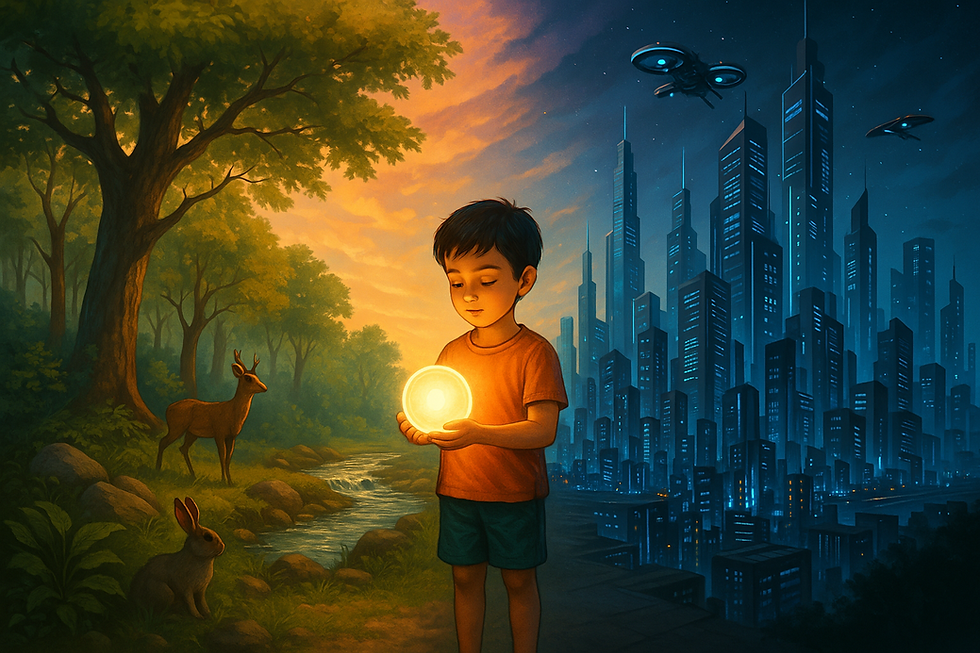Finding The Right Balance
- Mel Watts~ Artspire Therapy

- May 18, 2025
- 3 min read

We live in a world of wonder—where the marvels of technology and AI dazzle us with possibility. And yet, quietly beneath this glittering future, our natural world whispers its distress. The forests, oceans, and sky plead for our attention, reminding us that progress means little if we lose our grounding. As we surge ahead, we must also look back—rooted in preservation, in balance, in care.
There appear to be two waves of evolution unfolding before us. One is a return to a more natural way of living—rooted in ancestral practices and holistic rhythms, The other is the surge of our modern, fast-paced world. Like ripples from a stone cast into water, these two waves are destined to meet somewhere in the middle. I believe they must.
Yet, it feels as though we’re drifting further from nature, even though it was nature itself that gifted us the intelligence and curiosity that led to technological advancement. The industrial Revolution handed over physical labour to machines; now, AI steps in to relieve us of mental efforts as well.
As we navigate this age of artificial ease, the question remains: how do we embrace both worlds without allowing either to dominate? How can we harness technology while still engaging our full physical and mental potential—rather than letting it quietly slip away?
And still, there’s more. In this age of instant access and perpetual pinging, we awaken each day already depleted. Dopamine, once reserved for moments of delight, is now drained before breakfast by screens, scrolls, and stimulation. We are a species running on empty—children and adults alike—navigating a world that demands more than our nervous systems were ever built to bear.
Is it any wonder we are living in survival mode?
We push through hunger, ignore our thirst, even deny ourselves a moment to breathe or relieve our bladders—racing from task to task, app to app, expectation to expectation. And in schools? We see the cracks. We hear them—in the meltdowns, the outbursts, the whispers of “I can’t.” Our children are crying out—not for punishment, but for presence. And perhaps, for the first time, we’re finally listening.
Because this generation is growing up in an emotionally intelligent age. They are naming what they feel. They are learning to regulate, to express, to heal. And we, the grown-ups in the room—parents, educators, caregivers—are learning right alongside them. Healing wounds we didn’t know we had. Giving language to what once felt unspeakable.
I remember a lesson from my graduate work in school counselling: a professor spoke of the pendulum—that cultural shifts swing wide before they find their balance. From resilience to fragility, from silence to oversharing, from rigidity to over-accommodation. Has the pendulum swung too far? I don’t know. But I wonder…
Have we sheltered our children from the very discomfort that teaches them strength? Have we tried so hard to spare them from pain that we’ve stolen the gift of resilience?
Perhaps it’s time to let them wrestle—just a little—with frustration. To sit with discomfort. To build the muscles of self-belief through lived experience. Not to abandon them, but to walk beside them as they navigate life’s inevitable rough patches. Because confidence isn’t taught—it’s earned. It’s built through falling and rising, not through padding the ground beneath every step.
So, what now?
Now, we seek balance. We gather wisdom from both ends of the pendulum swing. We blend empathy with accountability, guidance with autonomy. We honour the power of technology and AI while also teaching our children how to pause, how to wonder, how to simply be.
Because the digital world isn’t going anywhere. It is a brilliant, permanent fixture in our lives. But it must be tamed—woven into our days with intention and care. Our children don’t need to fear it. They need to learn to navigate it. And it’s up to us—their guides, their mirrors—to show them how
Not perfectly. But consciously.
Let us raise a generation that learns from our missteps, not repeats them. Let us teach them not just how to use the world—but how to thrive within it.
With love,
Melanie Watts






